Analyzing Human Rights Enforcement & Civil vs Criminal Law TMA02
VerifiedAdded on 2023/04/23
|7
|1782
|66
Case Study
AI Summary
This assignment presents a case study analyzing human rights enforcement and the differences between civil and criminal cases within the UK legal system. It discusses how an individual can enforce their human rights through the European Court of Human Rights, detailing the process and relevant articles of the European Convention. The assignment also explores the membership and role of the European Council in EU law-making. Furthermore, it examines a scenario involving negligence and bodily harm, differentiating between civil and criminal proceedings, outlining the procedures followed in each type of court. The reflection on the problem-solving process highlights the challenges in distinguishing between civil and criminal aspects and understanding the complexities of the case, with a focus on improving future approaches to similar problem-style questions. Desklib provides comprehensive study tools and solved assignments for students.

TMA02 0
TMA02
Student’s Name
1-19-2019
TMA02
Student’s Name
1-19-2019
Paraphrase This Document
Need a fresh take? Get an instant paraphrase of this document with our AI Paraphraser
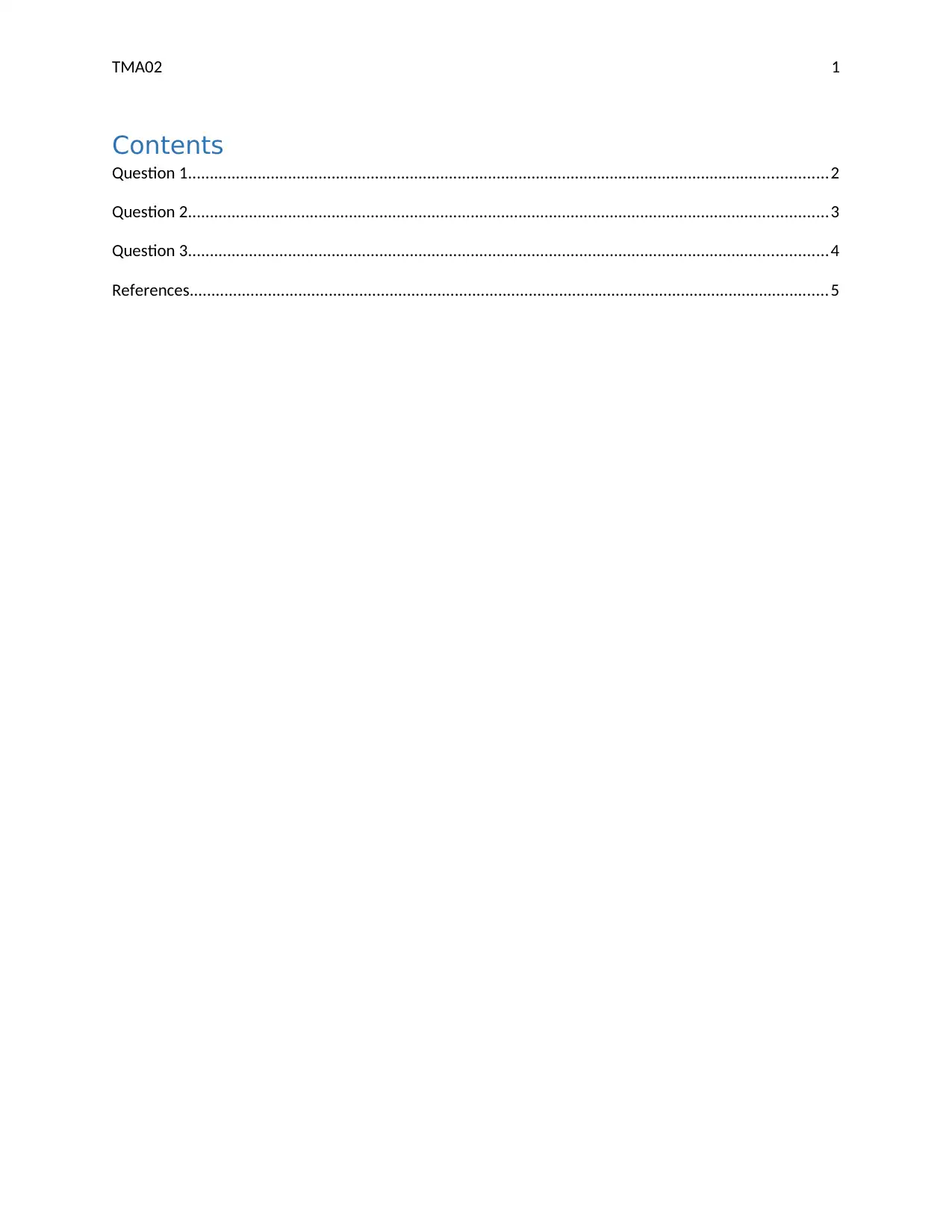
TMA02 1
Contents
Question 1...................................................................................................................................................2
Question 2...................................................................................................................................................3
Question 3...................................................................................................................................................4
References...................................................................................................................................................5
Contents
Question 1...................................................................................................................................................2
Question 2...................................................................................................................................................3
Question 3...................................................................................................................................................4
References...................................................................................................................................................5
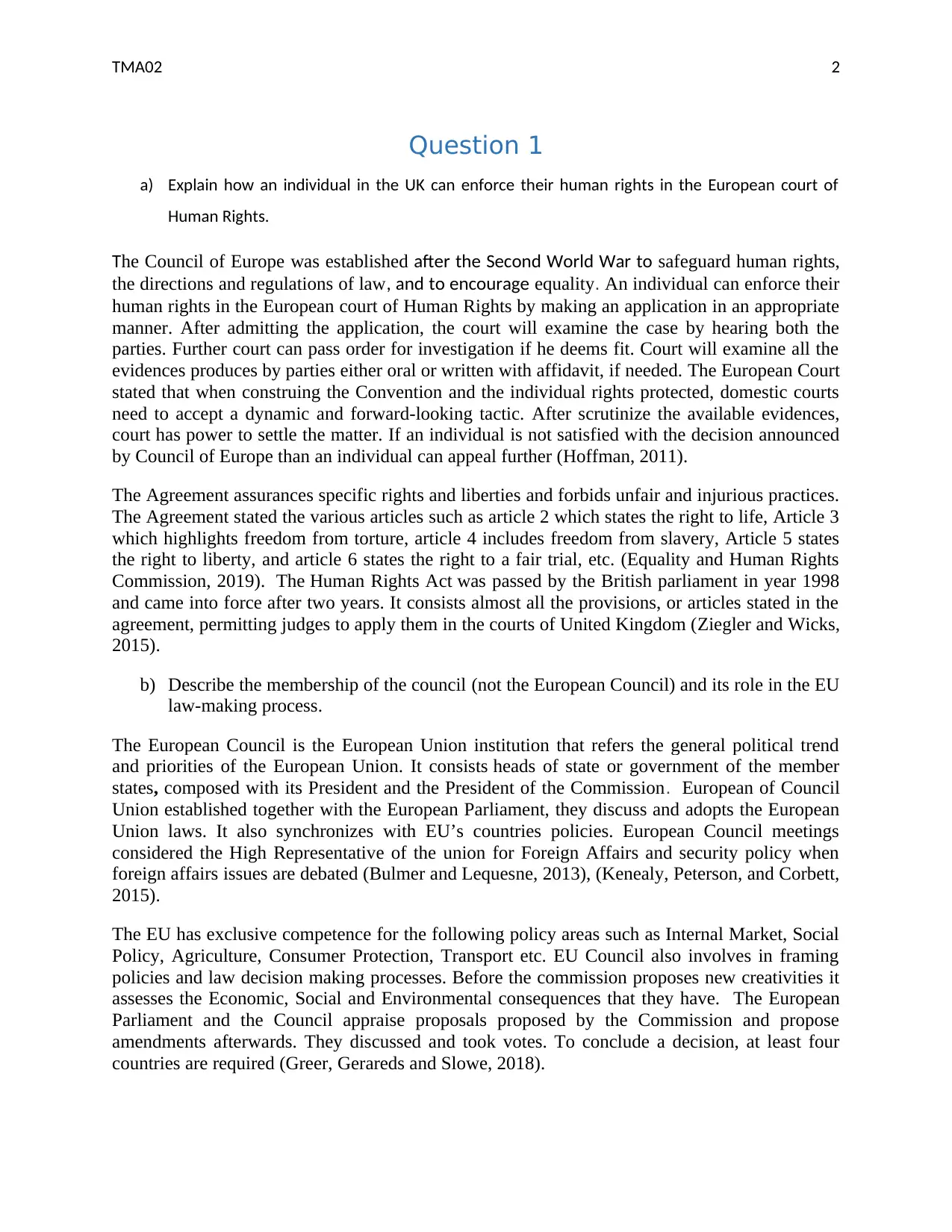
TMA02 2
Question 1
a) Explain how an individual in the UK can enforce their human rights in the European court of
Human Rights.
The Council of Europe was established after the Second World War to safeguard human rights,
the directions and regulations of law, and to encourage equality. An individual can enforce their
human rights in the European court of Human Rights by making an application in an appropriate
manner. After admitting the application, the court will examine the case by hearing both the
parties. Further court can pass order for investigation if he deems fit. Court will examine all the
evidences produces by parties either oral or written with affidavit, if needed. The European Court
stated that when construing the Convention and the individual rights protected, domestic courts
need to accept a dynamic and forward-looking tactic. After scrutinize the available evidences,
court has power to settle the matter. If an individual is not satisfied with the decision announced
by Council of Europe than an individual can appeal further (Hoffman, 2011).
The Agreement assurances specific rights and liberties and forbids unfair and injurious practices.
The Agreement stated the various articles such as article 2 which states the right to life, Article 3
which highlights freedom from torture, article 4 includes freedom from slavery, Article 5 states
the right to liberty, and article 6 states the right to a fair trial, etc. (Equality and Human Rights
Commission, 2019). The Human Rights Act was passed by the British parliament in year 1998
and came into force after two years. It consists almost all the provisions, or articles stated in the
agreement, permitting judges to apply them in the courts of United Kingdom (Ziegler and Wicks,
2015).
b) Describe the membership of the council (not the European Council) and its role in the EU
law-making process.
The European Council is the European Union institution that refers the general political trend
and priorities of the European Union. It consists heads of state or government of the member
states, composed with its President and the President of the Commission. European of Council
Union established together with the European Parliament, they discuss and adopts the European
Union laws. It also synchronizes with EU’s countries policies. European Council meetings
considered the High Representative of the union for Foreign Affairs and security policy when
foreign affairs issues are debated (Bulmer and Lequesne, 2013), (Kenealy, Peterson, and Corbett,
2015).
The EU has exclusive competence for the following policy areas such as Internal Market, Social
Policy, Agriculture, Consumer Protection, Transport etc. EU Council also involves in framing
policies and law decision making processes. Before the commission proposes new creativities it
assesses the Economic, Social and Environmental consequences that they have. The European
Parliament and the Council appraise proposals proposed by the Commission and propose
amendments afterwards. They discussed and took votes. To conclude a decision, at least four
countries are required (Greer, Gerareds and Slowe, 2018).
Question 1
a) Explain how an individual in the UK can enforce their human rights in the European court of
Human Rights.
The Council of Europe was established after the Second World War to safeguard human rights,
the directions and regulations of law, and to encourage equality. An individual can enforce their
human rights in the European court of Human Rights by making an application in an appropriate
manner. After admitting the application, the court will examine the case by hearing both the
parties. Further court can pass order for investigation if he deems fit. Court will examine all the
evidences produces by parties either oral or written with affidavit, if needed. The European Court
stated that when construing the Convention and the individual rights protected, domestic courts
need to accept a dynamic and forward-looking tactic. After scrutinize the available evidences,
court has power to settle the matter. If an individual is not satisfied with the decision announced
by Council of Europe than an individual can appeal further (Hoffman, 2011).
The Agreement assurances specific rights and liberties and forbids unfair and injurious practices.
The Agreement stated the various articles such as article 2 which states the right to life, Article 3
which highlights freedom from torture, article 4 includes freedom from slavery, Article 5 states
the right to liberty, and article 6 states the right to a fair trial, etc. (Equality and Human Rights
Commission, 2019). The Human Rights Act was passed by the British parliament in year 1998
and came into force after two years. It consists almost all the provisions, or articles stated in the
agreement, permitting judges to apply them in the courts of United Kingdom (Ziegler and Wicks,
2015).
b) Describe the membership of the council (not the European Council) and its role in the EU
law-making process.
The European Council is the European Union institution that refers the general political trend
and priorities of the European Union. It consists heads of state or government of the member
states, composed with its President and the President of the Commission. European of Council
Union established together with the European Parliament, they discuss and adopts the European
Union laws. It also synchronizes with EU’s countries policies. European Council meetings
considered the High Representative of the union for Foreign Affairs and security policy when
foreign affairs issues are debated (Bulmer and Lequesne, 2013), (Kenealy, Peterson, and Corbett,
2015).
The EU has exclusive competence for the following policy areas such as Internal Market, Social
Policy, Agriculture, Consumer Protection, Transport etc. EU Council also involves in framing
policies and law decision making processes. Before the commission proposes new creativities it
assesses the Economic, Social and Environmental consequences that they have. The European
Parliament and the Council appraise proposals proposed by the Commission and propose
amendments afterwards. They discussed and took votes. To conclude a decision, at least four
countries are required (Greer, Gerareds and Slowe, 2018).
⊘ This is a preview!⊘
Do you want full access?
Subscribe today to unlock all pages.

Trusted by 1+ million students worldwide
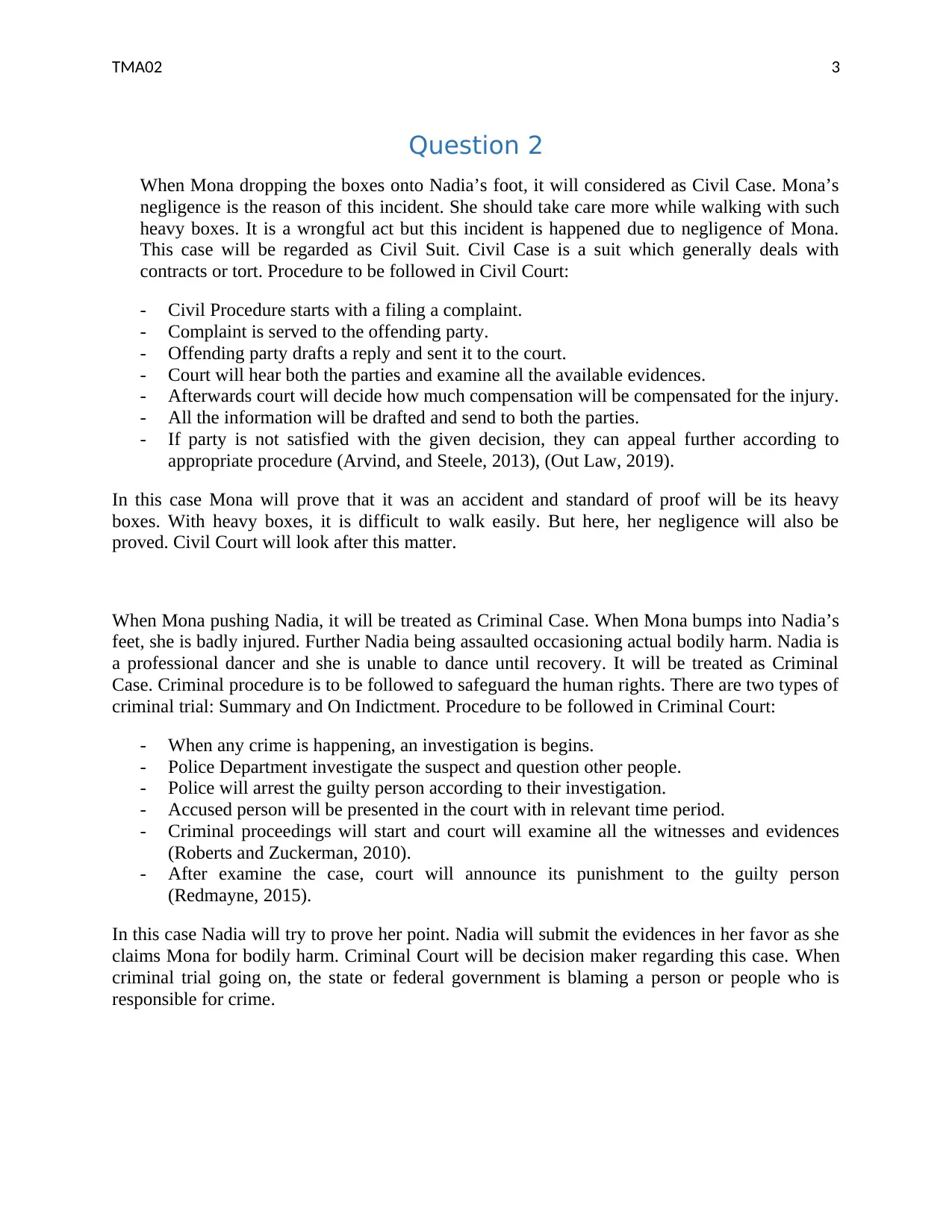
TMA02 3
Question 2
When Mona dropping the boxes onto Nadia’s foot, it will considered as Civil Case. Mona’s
negligence is the reason of this incident. She should take care more while walking with such
heavy boxes. It is a wrongful act but this incident is happened due to negligence of Mona.
This case will be regarded as Civil Suit. Civil Case is a suit which generally deals with
contracts or tort. Procedure to be followed in Civil Court:
- Civil Procedure starts with a filing a complaint.
- Complaint is served to the offending party.
- Offending party drafts a reply and sent it to the court.
- Court will hear both the parties and examine all the available evidences.
- Afterwards court will decide how much compensation will be compensated for the injury.
- All the information will be drafted and send to both the parties.
- If party is not satisfied with the given decision, they can appeal further according to
appropriate procedure (Arvind, and Steele, 2013), (Out Law, 2019).
In this case Mona will prove that it was an accident and standard of proof will be its heavy
boxes. With heavy boxes, it is difficult to walk easily. But here, her negligence will also be
proved. Civil Court will look after this matter.
When Mona pushing Nadia, it will be treated as Criminal Case. When Mona bumps into Nadia’s
feet, she is badly injured. Further Nadia being assaulted occasioning actual bodily harm. Nadia is
a professional dancer and she is unable to dance until recovery. It will be treated as Criminal
Case. Criminal procedure is to be followed to safeguard the human rights. There are two types of
criminal trial: Summary and On Indictment. Procedure to be followed in Criminal Court:
- When any crime is happening, an investigation is begins.
- Police Department investigate the suspect and question other people.
- Police will arrest the guilty person according to their investigation.
- Accused person will be presented in the court with in relevant time period.
- Criminal proceedings will start and court will examine all the witnesses and evidences
(Roberts and Zuckerman, 2010).
- After examine the case, court will announce its punishment to the guilty person
(Redmayne, 2015).
In this case Nadia will try to prove her point. Nadia will submit the evidences in her favor as she
claims Mona for bodily harm. Criminal Court will be decision maker regarding this case. When
criminal trial going on, the state or federal government is blaming a person or people who is
responsible for crime.
Question 2
When Mona dropping the boxes onto Nadia’s foot, it will considered as Civil Case. Mona’s
negligence is the reason of this incident. She should take care more while walking with such
heavy boxes. It is a wrongful act but this incident is happened due to negligence of Mona.
This case will be regarded as Civil Suit. Civil Case is a suit which generally deals with
contracts or tort. Procedure to be followed in Civil Court:
- Civil Procedure starts with a filing a complaint.
- Complaint is served to the offending party.
- Offending party drafts a reply and sent it to the court.
- Court will hear both the parties and examine all the available evidences.
- Afterwards court will decide how much compensation will be compensated for the injury.
- All the information will be drafted and send to both the parties.
- If party is not satisfied with the given decision, they can appeal further according to
appropriate procedure (Arvind, and Steele, 2013), (Out Law, 2019).
In this case Mona will prove that it was an accident and standard of proof will be its heavy
boxes. With heavy boxes, it is difficult to walk easily. But here, her negligence will also be
proved. Civil Court will look after this matter.
When Mona pushing Nadia, it will be treated as Criminal Case. When Mona bumps into Nadia’s
feet, she is badly injured. Further Nadia being assaulted occasioning actual bodily harm. Nadia is
a professional dancer and she is unable to dance until recovery. It will be treated as Criminal
Case. Criminal procedure is to be followed to safeguard the human rights. There are two types of
criminal trial: Summary and On Indictment. Procedure to be followed in Criminal Court:
- When any crime is happening, an investigation is begins.
- Police Department investigate the suspect and question other people.
- Police will arrest the guilty person according to their investigation.
- Accused person will be presented in the court with in relevant time period.
- Criminal proceedings will start and court will examine all the witnesses and evidences
(Roberts and Zuckerman, 2010).
- After examine the case, court will announce its punishment to the guilty person
(Redmayne, 2015).
In this case Nadia will try to prove her point. Nadia will submit the evidences in her favor as she
claims Mona for bodily harm. Criminal Court will be decision maker regarding this case. When
criminal trial going on, the state or federal government is blaming a person or people who is
responsible for crime.
Paraphrase This Document
Need a fresh take? Get an instant paraphrase of this document with our AI Paraphraser
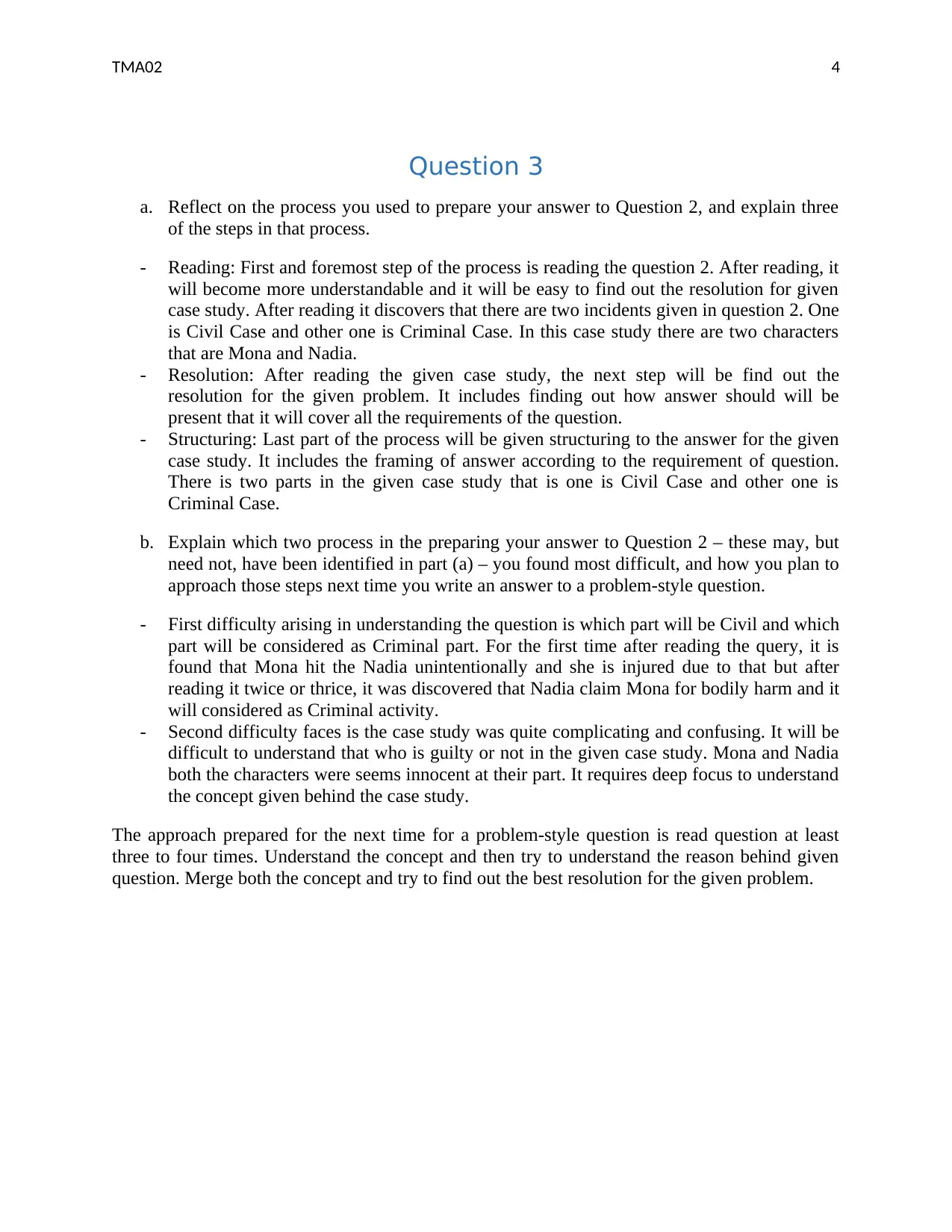
TMA02 4
Question 3
a. Reflect on the process you used to prepare your answer to Question 2, and explain three
of the steps in that process.
- Reading: First and foremost step of the process is reading the question 2. After reading, it
will become more understandable and it will be easy to find out the resolution for given
case study. After reading it discovers that there are two incidents given in question 2. One
is Civil Case and other one is Criminal Case. In this case study there are two characters
that are Mona and Nadia.
- Resolution: After reading the given case study, the next step will be find out the
resolution for the given problem. It includes finding out how answer should will be
present that it will cover all the requirements of the question.
- Structuring: Last part of the process will be given structuring to the answer for the given
case study. It includes the framing of answer according to the requirement of question.
There is two parts in the given case study that is one is Civil Case and other one is
Criminal Case.
b. Explain which two process in the preparing your answer to Question 2 – these may, but
need not, have been identified in part (a) – you found most difficult, and how you plan to
approach those steps next time you write an answer to a problem-style question.
- First difficulty arising in understanding the question is which part will be Civil and which
part will be considered as Criminal part. For the first time after reading the query, it is
found that Mona hit the Nadia unintentionally and she is injured due to that but after
reading it twice or thrice, it was discovered that Nadia claim Mona for bodily harm and it
will considered as Criminal activity.
- Second difficulty faces is the case study was quite complicating and confusing. It will be
difficult to understand that who is guilty or not in the given case study. Mona and Nadia
both the characters were seems innocent at their part. It requires deep focus to understand
the concept given behind the case study.
The approach prepared for the next time for a problem-style question is read question at least
three to four times. Understand the concept and then try to understand the reason behind given
question. Merge both the concept and try to find out the best resolution for the given problem.
Question 3
a. Reflect on the process you used to prepare your answer to Question 2, and explain three
of the steps in that process.
- Reading: First and foremost step of the process is reading the question 2. After reading, it
will become more understandable and it will be easy to find out the resolution for given
case study. After reading it discovers that there are two incidents given in question 2. One
is Civil Case and other one is Criminal Case. In this case study there are two characters
that are Mona and Nadia.
- Resolution: After reading the given case study, the next step will be find out the
resolution for the given problem. It includes finding out how answer should will be
present that it will cover all the requirements of the question.
- Structuring: Last part of the process will be given structuring to the answer for the given
case study. It includes the framing of answer according to the requirement of question.
There is two parts in the given case study that is one is Civil Case and other one is
Criminal Case.
b. Explain which two process in the preparing your answer to Question 2 – these may, but
need not, have been identified in part (a) – you found most difficult, and how you plan to
approach those steps next time you write an answer to a problem-style question.
- First difficulty arising in understanding the question is which part will be Civil and which
part will be considered as Criminal part. For the first time after reading the query, it is
found that Mona hit the Nadia unintentionally and she is injured due to that but after
reading it twice or thrice, it was discovered that Nadia claim Mona for bodily harm and it
will considered as Criminal activity.
- Second difficulty faces is the case study was quite complicating and confusing. It will be
difficult to understand that who is guilty or not in the given case study. Mona and Nadia
both the characters were seems innocent at their part. It requires deep focus to understand
the concept given behind the case study.
The approach prepared for the next time for a problem-style question is read question at least
three to four times. Understand the concept and then try to understand the reason behind given
question. Merge both the concept and try to find out the best resolution for the given problem.
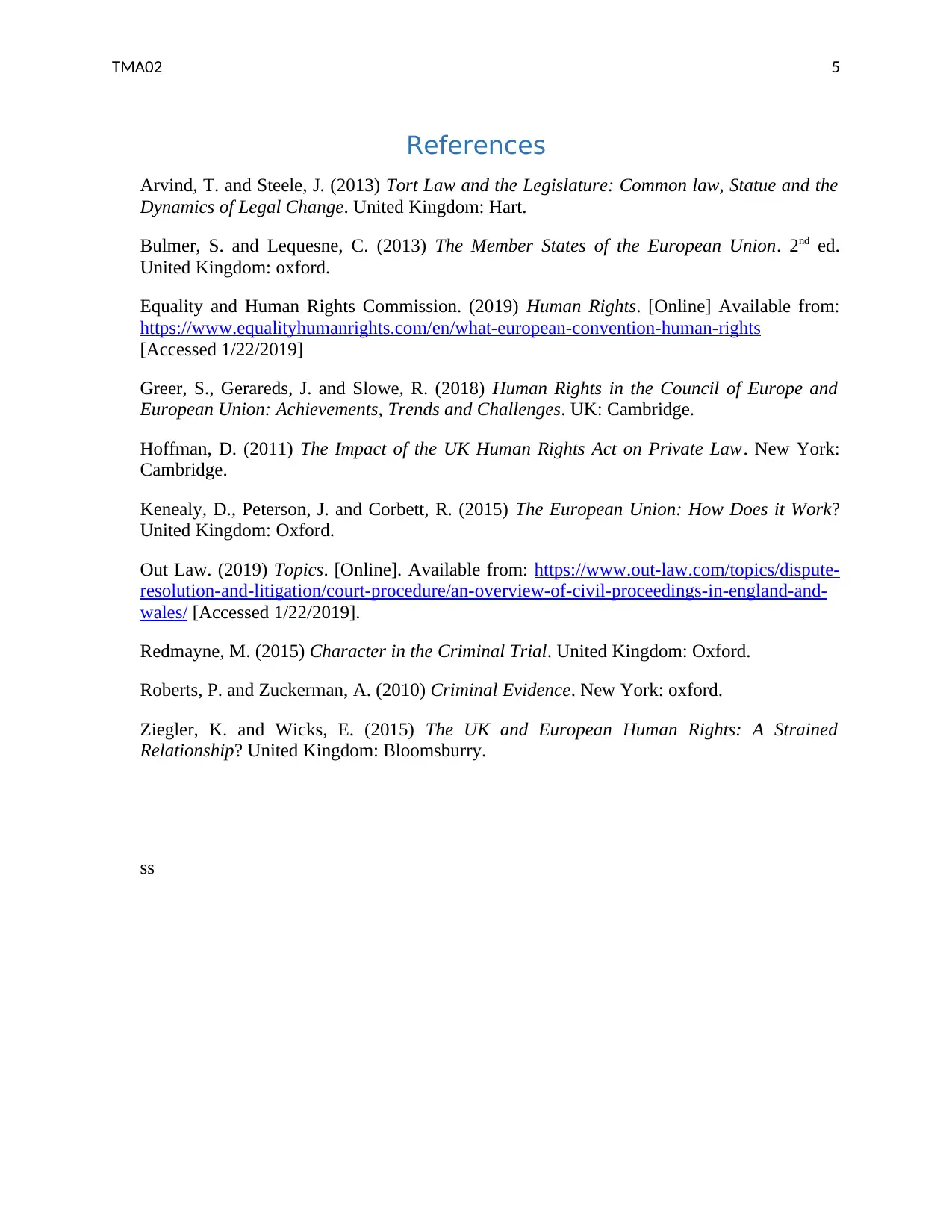
TMA02 5
References
Arvind, T. and Steele, J. (2013) Tort Law and the Legislature: Common law, Statue and the
Dynamics of Legal Change. United Kingdom: Hart.
Bulmer, S. and Lequesne, C. (2013) The Member States of the European Union. 2nd ed.
United Kingdom: oxford.
Equality and Human Rights Commission. (2019) Human Rights. [Online] Available from:
https://www.equalityhumanrights.com/en/what-european-convention-human-rights
[Accessed 1/22/2019]
Greer, S., Gerareds, J. and Slowe, R. (2018) Human Rights in the Council of Europe and
European Union: Achievements, Trends and Challenges. UK: Cambridge.
Hoffman, D. (2011) The Impact of the UK Human Rights Act on Private Law. New York:
Cambridge.
Kenealy, D., Peterson, J. and Corbett, R. (2015) The European Union: How Does it Work?
United Kingdom: Oxford.
Out Law. (2019) Topics. [Online]. Available from: https://www.out-law.com/topics/dispute-
resolution-and-litigation/court-procedure/an-overview-of-civil-proceedings-in-england-and-
wales/ [Accessed 1/22/2019].
Redmayne, M. (2015) Character in the Criminal Trial. United Kingdom: Oxford.
Roberts, P. and Zuckerman, A. (2010) Criminal Evidence. New York: oxford.
Ziegler, K. and Wicks, E. (2015) The UK and European Human Rights: A Strained
Relationship? United Kingdom: Bloomsburry.
ss
References
Arvind, T. and Steele, J. (2013) Tort Law and the Legislature: Common law, Statue and the
Dynamics of Legal Change. United Kingdom: Hart.
Bulmer, S. and Lequesne, C. (2013) The Member States of the European Union. 2nd ed.
United Kingdom: oxford.
Equality and Human Rights Commission. (2019) Human Rights. [Online] Available from:
https://www.equalityhumanrights.com/en/what-european-convention-human-rights
[Accessed 1/22/2019]
Greer, S., Gerareds, J. and Slowe, R. (2018) Human Rights in the Council of Europe and
European Union: Achievements, Trends and Challenges. UK: Cambridge.
Hoffman, D. (2011) The Impact of the UK Human Rights Act on Private Law. New York:
Cambridge.
Kenealy, D., Peterson, J. and Corbett, R. (2015) The European Union: How Does it Work?
United Kingdom: Oxford.
Out Law. (2019) Topics. [Online]. Available from: https://www.out-law.com/topics/dispute-
resolution-and-litigation/court-procedure/an-overview-of-civil-proceedings-in-england-and-
wales/ [Accessed 1/22/2019].
Redmayne, M. (2015) Character in the Criminal Trial. United Kingdom: Oxford.
Roberts, P. and Zuckerman, A. (2010) Criminal Evidence. New York: oxford.
Ziegler, K. and Wicks, E. (2015) The UK and European Human Rights: A Strained
Relationship? United Kingdom: Bloomsburry.
ss
⊘ This is a preview!⊘
Do you want full access?
Subscribe today to unlock all pages.

Trusted by 1+ million students worldwide

TMA02 6
1 out of 7
Related Documents
Your All-in-One AI-Powered Toolkit for Academic Success.
+13062052269
info@desklib.com
Available 24*7 on WhatsApp / Email
![[object Object]](/_next/static/media/star-bottom.7253800d.svg)
Unlock your academic potential
Copyright © 2020–2026 A2Z Services. All Rights Reserved. Developed and managed by ZUCOL.





